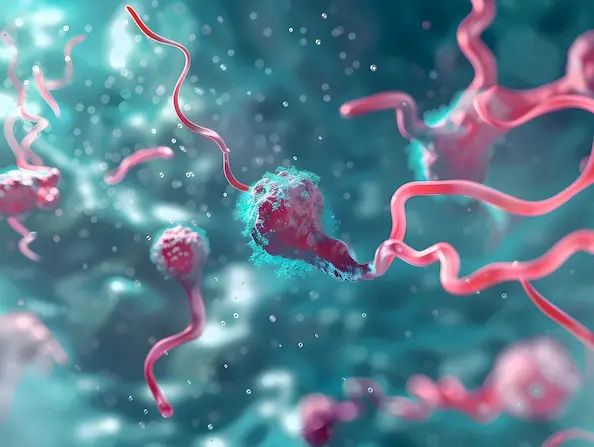Understanding and Managing PCOD and PCOS A Complete Guide
Learn about PCOD and PCOS, their symptoms, causes, and effective management strategies to support reproductive and overall health.

Written by Dr. Md Yusuf Shareef
Reviewed by Dr. Dhankecha Mayank Dineshbhai MBBS
Last updated on 13th Jan, 2026

Introduction
Are you struggling with irregular periods, unexplained weight gain, or acne? You might be one of the millions of women worldwide navigating the complexities of Polycystic Ovarian Disease (PCOD) or its more severe metabolic counterpart, Polycystic Ovary Syndrome (PCOS). While these terms are often used interchangeably, understanding the distinction is the first step toward effective management. This comprehensive guide will demystify PCOD and PCOS, breaking down their causes, symptoms, and diagnosis. More importantly, we will provide a clear, actionable roadmap for managing symptoms, improving your fertility prospects, and reclaiming your long-term health. Whether you’re newly diagnosed or seeking deeper insights, this article is your trusted resource for turning knowledge into power.
PCOD vs. PCOS: What's the Real Difference?
The confusion between PCOD and PCOS is common, but clarifying the difference sets the stage for appropriate care. Think of PCOD as a condition and PCOS as a more serious metabolic endocrine disorder.
Understanding PCOD (Polycystic Ovarian Disease)
PCOD is primarily characterised by the presence of multiple, immature or partially mature ovarian cysts. These cysts are typically follicles that have not released an egg during ovulation. In PCOD, the ovaries often become enlarged and produce excess androgens (male hormones), leading to symptoms like irregular periods. However, the hormonal imbalance is generally less severe. Many women with PCOD can still ovulate and conceive with minimal medical assistance. It is considered a common disorder, affecting a significant portion of women of reproductive age.
Understanding PCOS (Polycystic Ovary Syndrome)
PCOS, on the other hand, is a more complex metabolic syndrome. It's not just an ovarian issue; it's a systemic problem involving the endocrine system. The core driver is often severe insulin resistance, where the body's cells don't respond effectively to insulin. This leads to high insulin levels, which in turn trigger the ovaries to produce excessive androgens. This results in a more pronounced hormonal imbalance, causing the classic symptoms and carrying a higher risk of long-term health complications like type 2 diabetes and cardiovascular disease. PCOS is considered less common but more severe than PCOD.
A Simple Table to Compare PCOD and PCOS
Understanding the differences helps with better management.
Feature | PCOD (Polycystic Ovarian Disease) | PCOS (Polycystic Ovary Syndrome) |
Nature | Ovarian condition | Metabolic endocrine disorder |
Prevalence | More common | Less common |
Severity | Generally milder | More severe |
Primary Issue | Ovulatory dysfunction due to cysts | Severe hormonal imbalance & insulin resistance |
Ovaries | Enlarged, multiple cysts | Enlarged, multiple cysts |
Fertility Impact | Conception may be possible with help | Higher risk of infertility; requires intervention |
Long-term Risks | Lower | Higher (Diabetes, heart disease, etc.) |
Consult a Gynaecologist for the best advice
Unraveling the Causes: Why Does PCOS/PCOD Happen?
The exact cause remains unknown, but research points to a combination of genetic, hormonal, and lifestyle factors that create a perfect storm.
The Role of Insulin Resistance
This is a cornerstone, especially for PCOS treatment. When your body becomes resistant to insulin, your pancreas produces more insulin to compensate. High insulin levels are believed to increase androgen production by the ovaries, which disrupts ovulation. This is why a diet for PCOS weight loss often focuses on improving insulin sensitivity.
Genetic and Hormonal Factors
If your mother or sister has PCOS/PCOD, your risk is higher. The condition is linked to genes that affect hormone regulation. The key hormonal imbalances involve:
• High Androgens: Elevated levels of "male hormones" like testosterone cause hirsutism (excess hair growth) and acne.
• High Luteinising Hormone (LH): This can disrupt the menstrual cycle.
• Low Sex-Hormone-Binding Globulin (SHBG): This protein binds to testosterone. When SHBG is low, more free testosterone is available in the bloodstream, worsening symptoms.
The Inflammation Connection
Women with PCOS/PCOD often have low-grade inflammation. This inflammation can stimulate the ovaries to produce androgens and is also linked to insulin resistance and cardiovascular risks.
Recognising the Signs: Common Symptoms of PCOD and PCOS
Symptoms can vary widely from woman to woman, both in type and severity. Some may have only a few mild signs, while others experience a significant impact on their daily lives.
Reproductive and Menstrual Symptoms
• Irregular Periods: This is the most common sign. This includes periods that are infrequent (oligomenorrhea), absent for more than three months (amenorrhea), or excessively heavy.
• Difficulty Ovulating: This is a primary cause of infertility in women with PCOS.
• Polycystic Ovaries: Seen on an ultrasound, where the ovaries appear enlarged and contain numerous small, fluid-filled follicles surrounding the eggs.
Metabolic and Physical Symptoms
• Weight Gain: Unexplained weight gain or difficulty losing weight, particularly around the abdomen.
• Hirsutism: Excess facial and body hair (on the chin, chest, back).
• Acne and Oily Skin: Persistent acne, often along the jawline, that is resistant to typical treatments.
• Acanthosis Nigricans: Dark, velvety patches of skin in body folds like the neck, groin, and underarms, indicating insulin resistance.
• Hair Loss (Alopecia): Thinning of hair on the scalp, similar to male-pattern baldness.
Emotional and Psychological Impact
The physical symptoms are only part of the story. The hormonal fluctuations and challenges with body image can lead to:
• Anxiety
• Depression
• Poor self-esteem
This is why a holistic approach to management is crucial. If feelings of anxiety or depression are affecting your daily life, it's important to seek support. Consulting a therapist or a doctor online with Apollo24|7 can be a helpful first step.
Getting a Diagnosis: The PCOS/PCOD Diagnostic Process
There is no single test for PCOS/PCOD. Diagnosis is based on a process of elimination and meeting specific criteria. If you suspect you have symptoms, it's essential to consult a gynaecologist or endocrinologist for a proper evaluation.
The Rotterdam Criteria Explained
Most doctors use the Rotterdam Criteria. A diagnosis of PCOS is confirmed if you meet at least two of the following three criteria:
1. Irregular or Absent Periods: Indicating problems with ovulation.
2. Hyperandrogenism: Clinical signs (like hirsutism or acne) or biochemical signs (high androgen levels in blood tests).
3. Polycystic Ovaries on Ultrasound: The presence of 12 or more follicles in one or both ovaries.
Essential Tests: Blood Work and Ultrasounds
Your doctor will likely recommend:
• Blood Tests: To check hormone levels (androgens, LH, FSH, prolactin), thyroid function, and glucose/insulin levels. Apollo24|7 offers convenient home collection for tests like HbA1c and thyroid panels, making this initial screening easier.
• Pelvic Ultrasound: A transvaginal ultrasound to visualise the ovaries and measure the thickness of the uterine lining.
Get Your Health Assessed
The Long-Term Health Risks You Should Know About
Proper management isn't just about symptom control; it's about preventing serious complications. Unmanaged PCOS, in particular, increases the risk of:
• Type 2 Diabetes: Over 50% of women with PCOS develop diabetes by age 40 due to insulin resistance.
• Cardiovascular Disease: High cholesterol, high blood pressure, and increased risk of heart attack.
• Endometrial Hyperplasia and Cancer: When periods are absent for long periods, the uterine lining (endometrium) can build up, increasing cancer risk.
• Sleep Apnoea: Strongly linked to obesity and insulin resistance.
• Gestational Diabetes: During pregnancy.
Effective Management Strategies for PCOD and PCOS
While there is no permanent cure, symptoms can be effectively managed, and health risks significantly reduced through a multi-pronged approach.
Foundation of Management: Diet and Nutrition
Dietary changes are the most powerful tool. The goal is to stabilise blood sugar and improve insulin sensitivity.
Best Foods for PCOS/PCOD
• High-Fibre Vegetables: Broccoli, cauliflower, leafy greens.
• Lean Protein: Chicken, fish, tofu, lentils.
• Anti-inflammatory Foods: Berries, fatty fish (salmon), nuts.
• Low-Glycaemic Index Carbs: Whole grains, quinoa, sweet potatoes.
Foods to Limit or Avoid
• Sugary Drinks and Snacks: Soda, candy, pastries.
• Refined Carbohydrates: White bread, white rice, pasta.
• Processed Foods: Often high in unhealthy fats and sugar.
• Excessive Red Meat.
The Power of Regular Exercise
Exercise helps lower insulin resistance. A combination of:
• Aerobic Exercise: (e.g., brisk walking, cycling) for 30 minutes most days.
• Strength Training: Building muscle helps your body use insulin more efficiently.
Medical Treatments and Medications
Medications are tailored to your goals (symptom management or fertility).
Managing Symptoms and Regulating Cycles
• Combined Oral Contraceptives: The pill regulates periods and reduces androgen levels.
• Metformin: Improves insulin resistance and can aid in weight loss and cycle regulation.
• Anti-androgen Medications: Spironolactone can reduce hirsutism and acne.
Fertility Treatments
• Ovulation Induction: Medications like Clomiphene or Letrozole stimulate ovulation.
• In-Vitro Fertilisation (IVF): May be an option if other treatments fail.
Prioritising Mental and Emotional Well-being
Managing stress through yoga, meditation, or counselling is vital. Stress can worsen insulin resistance and hormonal balance. Connecting with support groups can also provide immense emotional relief.
Living Well with PCOD/PCOS: A Conclusion and Path Forward
Living with PCOD or PCOS is a journey, not a destination. It requires patience, persistence, and self-compassion. The path to management begins with an accurate diagnosis and a commitment to sustainable lifestyle changes. Remember, small, consistent steps like swapping a sugary drink for water or taking a daily walk can yield significant results over time. This condition may be a part of your life, but it does not define you. By becoming an expert in your own body and partnering with knowledgeable healthcare providers, you can effectively manage your symptoms, protect your future health, and live a full, vibrant life.
Consult a Gynaecologist for the best advice
Consult a Gynaecologist for the best advice

Dr. Saheli Kapat
Obstetrician and Gynaecologist
11 Years • MBBS, DNB Obstetrics & Gynaecology,FMAS(Fellowship in Minimal access surgery)
Kolkata
Dr. Saheli Kapat's Clinic, Kolkata

Dr. Plabani Sarkar
Obstetrician and Gynaecologist
17 Years • Advanced Diploma in Reproductive Medicine, University of Schleswig Holstein Kiel, Germany 2024 Fellowship - Reproductive Endocrinology and Infertility, PGIMER Chandigarh 2021 – 2022 Specialized in female endocrinology, endometriosis & male infertility. Certification in Reproductive Genetics,Valencia,Spain 2024 Certification in Oncofertility, American Society of Reproductive Medicine 2024 Certification in Obstetrics & Gynecological Ultrasounds,NHS-UK(Royal College of Radiologists) 2024 D.N.B. - Obstetrics & Gynaecology, NBE, New Delhi 2021 MD - Obstetrics & Gynaecology, AIIMS, New Delhi 2014 - 2016 Specialized in Laparoscopic, Hysteroscopic procedures & Infertility treatments. MBBS, R.G. Kar Medical College, Kolkata 2007 - 2013 Honours in Preventive & Social Medicine. Gold Medal in Forensic Science & Medicine.
Bengaluru
Apollo Clinic Mahadevapura, Bengaluru

Dr. Deepika Negi
Obstetrician and Gynaecologist
11 Years • MBBS,MS OBGYN
Greater Noida
SAMARPIT MEDICLINIC ORTHO and GYNAE CARE, Greater Noida

Dr. Sangeetha M
Obstetrician and Gynaecologist
21 Years • MBBS, MS ( Obstetrics & Gynaecology )
Bansdroni
Siddhita Healthcare., Bansdroni

Dr. Chaitali Roy
Obstetrician and Gynaecologist
28 Years • MBBS , MS (Obstetrics & Gynaecology)
Kolkata
Roy's Clinic, Kolkata
Consult a Gynaecologist for the best advice

Dr. Saheli Kapat
Obstetrician and Gynaecologist
11 Years • MBBS, DNB Obstetrics & Gynaecology,FMAS(Fellowship in Minimal access surgery)
Kolkata
Dr. Saheli Kapat's Clinic, Kolkata

Dr. Plabani Sarkar
Obstetrician and Gynaecologist
17 Years • Advanced Diploma in Reproductive Medicine, University of Schleswig Holstein Kiel, Germany 2024 Fellowship - Reproductive Endocrinology and Infertility, PGIMER Chandigarh 2021 – 2022 Specialized in female endocrinology, endometriosis & male infertility. Certification in Reproductive Genetics,Valencia,Spain 2024 Certification in Oncofertility, American Society of Reproductive Medicine 2024 Certification in Obstetrics & Gynecological Ultrasounds,NHS-UK(Royal College of Radiologists) 2024 D.N.B. - Obstetrics & Gynaecology, NBE, New Delhi 2021 MD - Obstetrics & Gynaecology, AIIMS, New Delhi 2014 - 2016 Specialized in Laparoscopic, Hysteroscopic procedures & Infertility treatments. MBBS, R.G. Kar Medical College, Kolkata 2007 - 2013 Honours in Preventive & Social Medicine. Gold Medal in Forensic Science & Medicine.
Bengaluru
Apollo Clinic Mahadevapura, Bengaluru

Dr. Deepika Negi
Obstetrician and Gynaecologist
11 Years • MBBS,MS OBGYN
Greater Noida
SAMARPIT MEDICLINIC ORTHO and GYNAE CARE, Greater Noida

Dr. Sangeetha M
Obstetrician and Gynaecologist
21 Years • MBBS, MS ( Obstetrics & Gynaecology )
Bansdroni
Siddhita Healthcare., Bansdroni

Dr. Chaitali Roy
Obstetrician and Gynaecologist
28 Years • MBBS , MS (Obstetrics & Gynaecology)
Kolkata
Roy's Clinic, Kolkata
More articles from Pcod Pcos Treatment
Frequently Asked Questions
1. Can PCOD/PCOS be cured permanently?
There is currently no permanent cure for PCOD or PCOS. However, it is highly manageable. With the right lifestyle interventions and medical treatments, symptoms can be controlled effectively, and most women lead healthy, normal lives.
2. What is the best diet for PCOS weight loss?
The most effective diet for PCOS weight loss is one that focuses on low-glycaemic index (low-GI) foods, high fibre, and lean protein. This helps control insulin levels. Examples include the Mediterranean diet or a low-carb diet, tailored to individual needs by a nutritionist.
3. How can I get pregnant naturally with PCOS?
While it can be challenging, some women can get pregnant with PCOS naturally by:
Achieving a healthy weight (even a 5-10% loss can restart ovulation).
Managing insulin resistance through diet and exercise.
Tracking ovulation using kits or charting basal body temperature.
4. Are PCOD and thyroid problems related?
Yes, there is a connection. Women with PCOS/PCOD have a higher prevalence of thyroid disorders, particularly Hashimoto's thyroiditis (an autoimmune condition). It's important to have your thyroid levels checked during diagnosis.
5. What are the natural remedies for PCOD?
Some natural remedies for PCOD that may help manage symptoms include:
Inositol: A vitamin-like substance that can improve insulin sensitivity and ovarian function.
Cinnamon: May help improve menstrual cyclicity.
Spearmint Tea: Some studies suggest it can reduce androgen levels.
Always consult your doctor before starting any new supplements.







